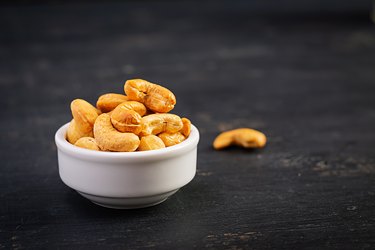
Once you start eating cashews, it can be hard to stop, given their unique buttery flavor. While their nutritional profile might make cashews a bit easier on the stomach than other nuts, and therefore an ideal snack for active people, eating too many at once can cause digestive problems.
"Nuts and seeds in general tend to be high in fat and fiber, but cashews are a little lower in those nutritional components and a little bit higher in protein and carbohydrate than many other nuts," says Katherine Zeratsky, RDN, a registered dietitian nutritionist with the Mayo Clinic in Rochester, Minnesota.
Video of the Day
Video of the Day
"Fat and fiber can cause gastrointestinal problems in athletes if they consume too much before a rigorous workout, so they need to be cautious," she says. "But cashews, being a little lower in fat and fiber, might be a bit more athlete-friendly than other nuts."
Related Reading
Cashew Nutrition
Cashew health benefits start with the fact that they are slightly lower in calories than many other nuts. An ounce of raw cashews has 153 calories, compared with 164 calories in an ounce of almonds and 186 calories in an ounce of walnuts, according to the USDA.
"Every nut has its own unique nutritional profile," Zeratsky says. "Cashews have about 12 grams of fat per ounce, whereas most other nuts have 15 to 16 grams. And while other nuts have 2 to 3 grams of protein, cashews have about 5 grams per ounce and are a bit higher in carbohydrates than other nuts."
Cashews are also a source of vitamin K, copper, iron and magnesium, according to the Micronutrients Information Center at the Linus Pauling Institute at Oregon State University.
But the most abundant vitamin in cashews is vitamin E, according to a March 2016 study in Food Science & Nutrition. Vitamin E acts as an antioxidant, a class of compounds that protect cells from the damage of free radicals, unstable molecules that might play a role in cancer and cardiovascular disease, according to the National Institutes of Health. But Zeratsky cautions that there needs to be a better understanding of how antioxidants perform in the human body.
"There is breakdown, growth and repair going on in the body at all times, and antioxidants may have some sort of protective effect against damage, but until we understand better how it all works, we can only say 'potentially,'" she says. "We are some distance from understanding antioxidants' exact role."
Cashews and Your Gut
Cashews are relatively high in saturated fat, according to Harvard Medical School. Though the data on saturated fats is conflicting, the American Heart Association recommends limiting saturated fats to 5 to 6 percent of your daily calories, which would be about 13 grams of saturated fat for a 2,000-calorie diet.
But the saturated fat in cashews derives largely from stearic acid, which is thought to have a neutral effect on blood cholesterol. In fact, one small May 2017 study in the American Journal of Clinical Nutrition described a nearly 5 percent drop in LDL cholesterol in people who ate cashews, compared with people who ate potato chips.
The most abundant fat in cashews, making up about 60 percent of their fat composition, is monounsaturated fat, Zeratsky says. "Monounsaturated fat appears to be heart-healthy," she says. "This is the reason olive oil has such a good reputation."
In terms of gut health, though cashews are reasonably well-tolerated by most people, they may be problematic for people sensitive to FODMAPS (fermentable oligosaccharides, disaccharides, monosaccharides and polyols). Cashews are one of many different types of foods — among them wheat, onions, legumes (like beans, peas and lentils) and artichokes — that can trigger diarrhea in people who have irritable bowel syndrome, according to an August 2017 Nutrients study.
Also, you can get too much of a good thing. "When someone is hungry and eats several handfuls of nuts, the sheer volume of fat and fiber, even in cashews, can upset your stomach and make you feel bloated and gassy," Zeratsky says.
"But a quarter-cup or less at a time, possibly incorporated into a meal or added to a salad, should be tolerable," she says. "They taste good, and I would encourage people to eat the nuts they enjoy in a reasonable portion."
- Katherine Zeratsky, RDN, LD, registered dietitian nutritionist, Mayo Clinic, Rochester, Minnesota
- U.S. Department of Agriculture: “Cashews”
- Micronutrient Information Center, Linus Pauling Institute, Oregon State University: “Micronutrients for Health”
- Food Science & Nutrition: “Nutritional Composition of Raw Fresh Cashew Kernels From Different Origins”
- National Institutes of Health: “Vitamin E”
- Harvard Medical School: “Cashews: A Better Choice Than Low-Fat Chips?”
- American Heart Association: “Saturated Fat”
- American Journal of Clinical Nutrition: “Cashew Consumption Reduces Total and LDL Cholesterol: A Randomized, Crossover, Controlled-Feeding Trial”
- Nutrients: “Low-FODMAP Diet Improves Irritable Bowel Syndrome Symptoms: A Meta-Analysis”
Is this an emergency? If you are experiencing serious medical symptoms, please see the National Library of Medicine’s list of signs you need emergency medical attention or call 911.